Marathons are not for everyone. The grueling physical labor that marathons entail will weed out those who are tough enough mentally and physically to take it on.
Before the idea of joining a marathon appealed to me, I wasn’t even considered a runner. I might’ve watched the Olympics on the couch but that’s about it. It wasn’t until I heard David Goggins’s story that it got me into it.
I was so fixated on my marathon and ensuring I had the right level of training in time. However, I was oblivious to the fact that this sport has created and continues to create legends who will be etched in history.
It will be hard to identify the best runner, as each one has a unique talent and heart that made them shine in the sport. So let’s take a look at the top 10 best marathon runners of all time. Be inspired by these legends as we go through them one by one.
Top 10 Best Marathon Runners Of All Time
1. Roger Bannister
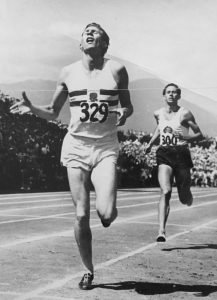 Roger Bannister is considered a household name in the world of running. His fame stems from his record-breaking 4-minute mile run, a feat that no other man has conquered before him.
Roger Bannister is considered a household name in the world of running. His fame stems from his record-breaking 4-minute mile run, a feat that no other man has conquered before him.
He was 25 years old when he attempted to attain this record, and he had minimal training back then. Roger just recently participated in the 1952 Olympics in Helsinki wherein he only won 4th place, but it was still momentous as he set a record in the 1500 meter-run. This inspired him to break even more records including the 4-minute mile run. Talk about bouncing back from a fall, right?
It was on a fateful day, May 6, 1954, together with Chris Chataway, a long-distance runner and reporter, and Chris Basher, a track-and-field runner and the founder of the London Marathon, who both provided the pacing, when Roger broke the record. The crowds were already cheering and screaming in delight as the announcer mentioned the word ‘three’ as he announced the official time.
He held this record for about a month or so when another runner broke it again. Nevertheless, Roger has already made his name in the sport as the first runner ever to run the 4-minute mile.
2. Sohn Kee-Chung
 Born and raised in the land of the morning calm, Sohn Kee-Chung is the athlete who is known to be the first Korean to bag a medal at the Olympic games. He brought a lot of controversy during his career as he was born at a time when Korea was under the colonial rule of Japan. Due to this, he had to run under the name: Son Kitei.
Born and raised in the land of the morning calm, Sohn Kee-Chung is the athlete who is known to be the first Korean to bag a medal at the Olympic games. He brought a lot of controversy during his career as he was born at a time when Korea was under the colonial rule of Japan. Due to this, he had to run under the name: Son Kitei.
Sohn competed for Japan and won the gold medal at the 1936 Berlin Olympics. He was a member of the Japanese delegation then, and he was very ashamed to win his title in that stature. So ashamed that he didn’t acknowledge the national anthem of the Japanese as it played during the awarding ceremony.
He even had publishers from the newspapers omit the flag of Japan as he stood in the podium. This was one of the most rebellious acts back then against Japan, and it resulted in nine journalists being imprisoned and a few newspapers being suspended for about nine months.
Nevertheless, despite the political dilemma he is in, Song has proven to be one of the best runners of all time: he competed in 12 marathons between 1933 to 1936 and was in the top 3 on most of them, bagging 9 championships out of the 12. He set a world at 2:26:42 in the marathon; a feat which was beaten by his own apprentice in the Boston marathon of 1947.
3. Joan Benoit
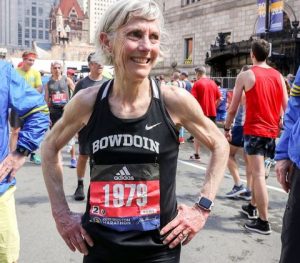 There is a lot of controversies enveloping the world of athletics and women athletes. But women bring their own grace, speed, and athleticism on the track and Joan Benoit is the living testament to that. One of her most prominent awards, in a long line of awards in her lifetime, was winning the first women’s Olympic marathon in Los Angeles.
There is a lot of controversies enveloping the world of athletics and women athletes. But women bring their own grace, speed, and athleticism on the track and Joan Benoit is the living testament to that. One of her most prominent awards, in a long line of awards in her lifetime, was winning the first women’s Olympic marathon in Los Angeles.
Benoit was born in Maine, USA, where she studied at Bowdoin College and was exceptional in athletics. She started focusing on her running when she got her scholarship at North Carolina State and there she earned honors from 1977 to 1978. She was also recognized as the best cross-country female runner and received a Honda Sports Award for it.
When she graduated from Bowdoin, she joined the Boston Marathon as a nobody and emerged as the champion and a record-breaking finish. For 28 years, she held her record as the fastest American woman at that race.
At the age of 46, Benoit joined the half-marathon in Maine, defeating runners who were twice less than her age, as well as finishing faster than the men’s time. At the age of 50, she was breaking records at the Senior Masters for runners older than 50 beating her personal time and record time. Joan’s accomplishments will be taking up the whole list if I continue on, so let’s move on to the next runner.
4. Haile Gebrselassie
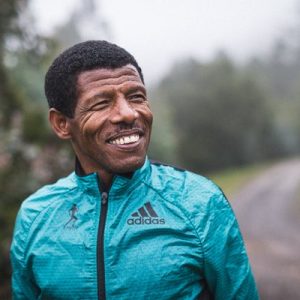 Barefoot on sand and dirt, dusty and the sun at its highest— this is how the legendary Haile ran his first few miles at a young age. He ran ten kilometers every single day to go to his school, ran back to get home.
Barefoot on sand and dirt, dusty and the sun at its highest— this is how the legendary Haile ran his first few miles at a young age. He ran ten kilometers every single day to go to his school, ran back to get home.
Gebre was born in the era when cross-country Kenyan runners were the toughest opponents to beat. But for him, the most important person to beat was himself. He was always critical of himself and was a perfectionist in every aspect. When he set a new record for 10000 meters, he wasn’t fully happy as he thought he could’ve done better. His best marathon time is 2:03:59.
Gebre has a long list of medals and wins from the Olympics, Indoor Championships, World Championships, and every special running event where the best of the best compete. But this is not only the reason why Gebre is so popular and well-loved in his country. When he retired as a professional athlete, he started to focus his life on the development of Ethiopia.
He is now a UNICEF ambassador, and he spends his days dedicated to helping his fellow Ethiopians. He creates jobs for them, builds schools, and trains younger athletes in the path they want to take. Gebre is an example of using your stature and accomplishments for the betterment of another.
5. Wilson Kipsang Kiprotich
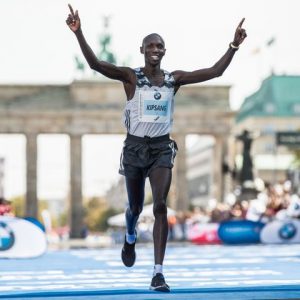 A Kenyan who has made his mark in marathons, Wilson’s resume comprises a long list of wins from marathons from all over the world, stretching from 2012 to 2018. He bagged the bronze medal at the 2012 Summer Olympics.
A Kenyan who has made his mark in marathons, Wilson’s resume comprises a long list of wins from marathons from all over the world, stretching from 2012 to 2018. He bagged the bronze medal at the 2012 Summer Olympics.
He was also the record holder for the best marathon time set at the Berlin Marathon 2013, wherein he ran consistently under 2 hours and 4 minutes on 4 marathons. Kipsang didn’t share many stories with the public and he was the kind of guy who kept to himself and only let his medals speak for him.
While he has a great track record, just recently though, the AIU or the Athletics Integrity Unit has provisioned a suspension on him for ‘whereabouts failures’ and ‘attempted tampering’. For context, the World Anti-Doping Agency requires athletes to report their location for one hour every day, as well as accommodation and training details in case random testing needs to be conducted.
Until his case is settled, he will be on suspension.
6. Eliud Kipchoge
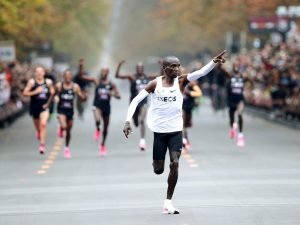 Kipchoge’s wisdom and philosophy set him apart from other marathoners. Dubbed “The Greatest Marathoner, Ever” by The New York Times, not only does he have outstanding times that no one else has beaten, but he also has the discipline and the humility that had built him up to the athlete that he is today.
Kipchoge’s wisdom and philosophy set him apart from other marathoners. Dubbed “The Greatest Marathoner, Ever” by The New York Times, not only does he have outstanding times that no one else has beaten, but he also has the discipline and the humility that had built him up to the athlete that he is today.
His humble beginnings make his achievements more admirable. Born in Kapsisiywa, Kenya, he spent most of his childhood days jogging around. This was how he got to school and back home, and when he had to support his family as a teenager, he would jog around his neighborhood collecting milk to sell at a market. In hindsight, it seems his running career was meant to happen.
His career grew as he would constantly ask Patrick Sang for training programs. After winning a regional race, Kipchoge would have Sang as his mentor. He only went up from there, winning an Olympic bronze medal in 2004 and silver in 2008 in the 5,000 meter runs. But the pivotal moments in his career came when Kipchoge finished seventh in the 5,000 meters run at the 2012 Kenya’s Olympic trials. He was not accepted into the Olympic team.
Then he redirected his failure into becoming the greatest marathoner. His first marathon in Hamburg was done at 2:05:30. After finishing second in Berlin, he has gone undefeated. He has even won the gold at the 2016 Olympic Games. His most recent achievement: running a marathon at 1:59:40.
He has said, when asked about beating the world record, “To be precise, I am just going to try to run my personal best. If it comes as a world record, I would appreciate it. But I would treat it as a personal best.”
Talk about someone that’s obviously mastered the runners wall!
7. Kathrine Switzer
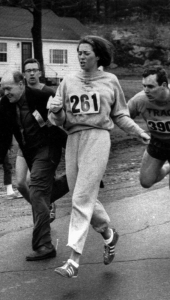 One of the women who changed the landscape of sports for women all over the world was Kathrine Switzer. Her historic run in the Boston Marathon in 1967 would pave the way for women to be officially allowed to run the marathon.
One of the women who changed the landscape of sports for women all over the world was Kathrine Switzer. Her historic run in the Boston Marathon in 1967 would pave the way for women to be officially allowed to run the marathon.
Kathrine Switzer was a journalism student at Syracuse University. For the lack of a women’s running team at her university, she joined the men’s cross-country team. 50-year-old Arnie would train her every night. When she brought up the idea of running the Boston marathon to Arnie after he would tell story after story about famous Bostons, he would tell her that “no woman can run the Boston Marathon.”
Switzer proved him wrong by running the distance in training, even adding in an extra 5 miles because of how easy it felt to her. Arnie fell down cold after that run. Not long after she was running the race. A lot of the guys there were stunned to see a girl running the same marathon as them.
After a while of running, she feels grabbed by the shoulder by a huge man, saying, “Get the hell out of my race and give me those numbers!” Despite her fear, she tried to keep running, but the man had a hold of her. In all of this chaos, her boyfriend Tom Miller pushed him out of the way, and they kept running. They would later realize that this was Jock Semple, a race official.
This only fired her up to finish the race because everyone thought she couldn’t. 5 years after her finishing the Boston Marathon, Boston had accepted women into the race.
8. Paula Radcliffe
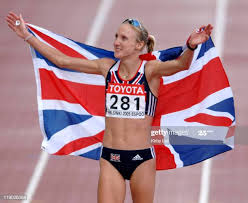 Women before her gave Paula Radcliffe the fire and inspiration she needed to start running, and she never looked back. In particular, she saw Ingrid Kristiansen running the London Marathon amongst the male-dominated marathon. Radcliffe knew, if Kristiansen could do it, she could do it too. At the age of nine, she started running.
Women before her gave Paula Radcliffe the fire and inspiration she needed to start running, and she never looked back. In particular, she saw Ingrid Kristiansen running the London Marathon amongst the male-dominated marathon. Radcliffe knew, if Kristiansen could do it, she could do it too. At the age of nine, she started running.
She proved it to be true when she first won the marathon in 2002. Not only did she finish, in 2003, but she would also set her world record of 2:15:25. Then she would win the London Marathon again in 2005. Her trainers and team would attribute this success to her high pain tolerance. While training, it is said that she would rather fall off the treadmill out of exhaustion than ask her trainer to stop.
Not only does her endurance and tolerance help her break through her own records, but she also has a VO2 max higher than the typical female athlete seen in scientific literature. All of these, along with her discipline and drive, gave her the tools to inspire and normalize other women to go out and run.
She would train 140 to 150 miles a week, which is very telling of her perseverance. However, at 41, her running career has ended because of an irreversible injury to her left foot. She ran her last and emotional London Marathon, thanking as many people as she could as she ran her last mile.
9. Kenenisa Bekele
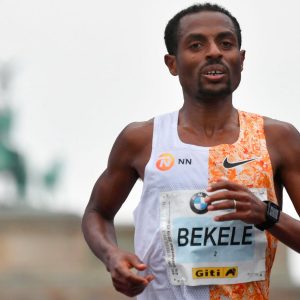 Starting off as a football player, Kenenisa Bekele quickly found his love for running in Ethiopia, and it shows in his successful career. He first found success in cross-country running. At the 2002 World Cross Country Championships in Dublin, he became the first man to win the long and short races. He kept this title in 2003 and 2004.
Starting off as a football player, Kenenisa Bekele quickly found his love for running in Ethiopia, and it shows in his successful career. He first found success in cross-country running. At the 2002 World Cross Country Championships in Dublin, he became the first man to win the long and short races. He kept this title in 2003 and 2004.
The person who inspired him to pursue his running career was Haile Gebrselassie. It was a great moment in his career when he raced alongside his idol in the 10,000m run. As Gebrselassie started slowing down, he slowed down in an attempt to let him catch up. But he eventually ran to his victory, setting an Olympic record by running the last lap in only 53 seconds.
He set another record by winning both the 10,000m run and the 5,000m run in Beijing, making himself the first man in 25 years to win these two events in the same Olympiad. His legendary status as a runner is proved by his 21 Olympic and World Champion titles. Breaking 6 senior world records, he deserves to be called one of the top marathoners in the world.
If those titles weren’t enough, he set a new record in the Berlin marathon of 2:01:41, making him the second-fastest athlete ever over that distance.
10. Emil Zátopek
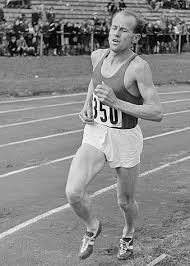 Emil Zátopek has revolutionized the way running was seen as a sport. The way runners train now and the way runners push their bodies to extreme measures in order to beat their own records all can be attributed to the Czech legend.
Emil Zátopek has revolutionized the way running was seen as a sport. The way runners train now and the way runners push their bodies to extreme measures in order to beat their own records all can be attributed to the Czech legend.
You can’t say Zátopek was born with his talents. He trained with such high volume and intensities. Although people wrongly attribute interval training to him, he only used this technique to transform running. He alternated sprinting then jogging. Soon enough, he was doing 100 fast 400m laps a day because of this technique
He would treat his running career almost like a science experiment. He would try different techniques, such as holding his breath until he passed, or eating what fast-running deer eat. His determination perseverance drove him to even try carrying his widow and a child on his back while he ran. What’s admirable about this approach is how dedicated he is, going to lengths no one else has.
After several achievements, including winning three gold medals in the Olympic distance-running events, he became even more and more famous. But after he retired, he was driven out of public life due to the Communist regime present in his country. Despite him being gone from the spotlight, he remains remembered by many runners today.
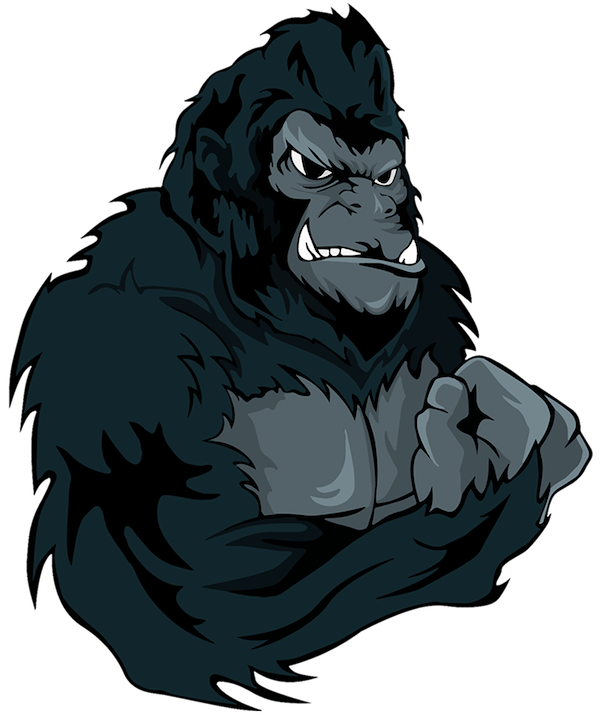 Editor’s Corner
Editor’s Corner
Don’t be intimidated by the times of these runners, they’re the best in the world. Starting to train for a marathon (And racing one) is one of the best experiences that you’ll have in your life.
You will learn a lot about yourself, and will be more dedicated with your time. You might even find the energy bursts into other areas of your life. This is a very joyful feeling. Ever felt like joining one? Don’t wait. There are marathons happening in almost every country. Start with a half-marathon first! If you’re interested in some tips to become a better runner click here.
Conclusion
Each runner on this list has imprinted his own mark in history which has deemed them, one way or another, as the greatest of all time. The measure of the best athlete is almost impossible to determine, but the variety of personalities, stories, and history just makes it all the more inspirational for aspiring champions like you and me.
Preparing for your first marathon might seem like an intimidating task, however with the right amount of training and determination anyone can do it. I went from addiction, anxiety to living a happy life and having completed a marathon. If I can do it, anyone can.
The mental health benefits of running help you move forward when the days get tough (We all get them). Training for something like a marathon will set you on a long path of self achievement which in itself totally worth it. If you’re just starting out, click here to see my post on running shoes for beginners and how to go about finding your first pair.
What do you think of the list? Is there a runner that isn’t mentioned that should be here? Let me know in the comments below!
Sources:
https://www.injinji.com/blog/the-13-best-runners-of-our-time/
https://www.usatoday.com/story/sports/2018/03/04/roger-bannister-dies/393123002/
https://www.theguardian.com/sport/haile-gebrselassie
https://www.olympic.org/kenenisa-bekele
https://en.wikipedia.org/wiki/Haile_Gebrselassie#World_records_and_best_performances
https://www.worldathletics.org/athletes/ethiopia/haile-gebrselassie-14181475
https://www.theguardian.com/sport/haile-gebrselassie
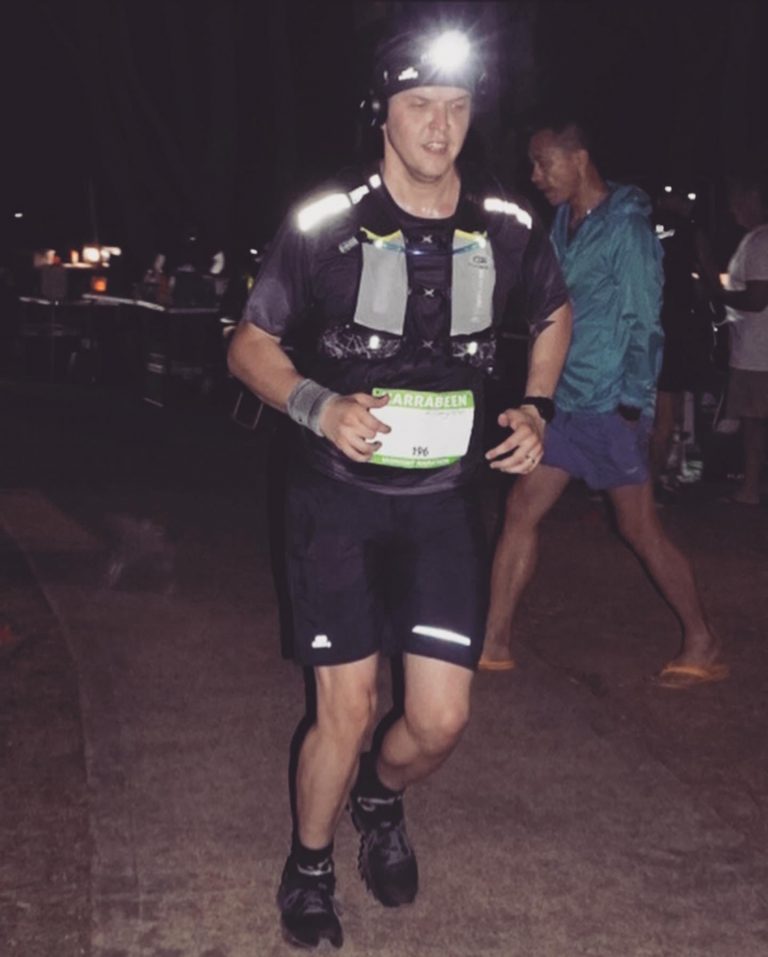
Marko Rakic is a trail runner and fitness enthusiast from Sydney, Australia. He is the lead writer for The Ultimate Primate and believes the best way to live a happy life is through constantly challenging yourself.
